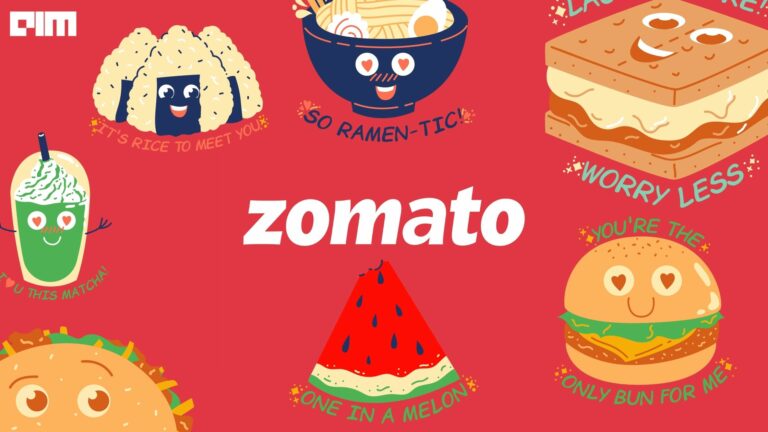Analytics India Magazine caught up with Naresh Mehta, AVP, Data Science & Analytics who leads the data science and machine learning team at Zomato. Talking about his role, Mehta shared the team works on most of the product back-end algorithms such as listing sort algorithm, homepage customisation, user personalisation, keyword search, product feature A/B experiments and clickstream funnel among other areas. “We are increasingly getting involved in driving commercial and operational efficiencies such, as for logistics optimisation, call centre/driver fleet capacity planning, delivery time prediction, ad delivery, supply prioritization which are some of the key areas,” said Mehta. The team also boasts of a few deep learning professionals who are involved in menu image parsing and UGC moderation for image classification, aesthetic scoring and also do NLP on reviews.

For those in the know, Mehta, an IIT-Madras alumnus started his analytics journey as a consultant with ZS Associate. He spent close to 5 years at Dunnhumby across Delhi, London and Edinburgh offices and it is there his role evolved from a statistician to a client facing research analyst and further as a client servicing consultant. “It was at DH that I built my first proper classification model and felt the power of data while working on extremely rich user-item level shopping carts — seeing the strong correlations between credit card fraud and the brand of wine one purchased felt magical, rather empowering! Data only got bigger and faster as I moved into the world of click-stream data, but the basics of data modelling and generating critical insights from terabytes of raw data are still the same,” he revealed.
Driving a data-driven culture at Zomato
Presently, the 150-strong engineering team at Zomato includes data scientists, product managers and analysts. “At an individual level, I continue to be fairly hands-on working directly with data which takes 40% part of my time. Another 30% of the time is spent in meetings with team members – clearing roadblocks, ensuring alignment between data scientists/statisticians and ML engineers/developers who are putting models in production,” he shared. Another 20% of Mehta’s time goes in meeting stakeholders from other teams – since the work directly impacts different business verticals and product features, so alignment with business heads and product managers is critical. “The rest 10% is dedicated to learning and developing – data science domain is evolving very fast, and it is crucial to stay abreast of recent developments. For example, if we solely look at tree-based models, basic CART got replaced by RF which got replaced by GBMs which is now being replaced by ensemble models – all this in last three years,” he said.
Staving Off Competition In The Foodtech Market With Machine Learning
According to a report by TechSci Research, the foodtech market in India is projected to grow at a robust pace, at a CAGR of over 12% during 2016 – 2021. The growth is expected because of the increasing internet penetration and proliferation of smartphone users coupled with budding e-commerce market and rising young working population. In this backdrop, the number of foodtech players and aggregators have swelled –Swiggy, FoodPanda, InnerChef and FreshMenu.
So, how does Zomato, an extremely data-driven company maintain a competitive edge? Gurgaon-headquartered company is using machine learning to improve product UX, through personalisation and superior features, as well as to drive more efficiencies into our commercial and operational verticals across both online ordering and restaurants listing business.
At a time when every company is trying to position itself as a AI/ML company, Mehta emphasises how Zomato firmly believes in and consciously practice “AI for business”. “There is no point building extremely advanced neural net architectures to solve a problem which barely moves the needle for business KPIs. Entire prioritisation of all kind of things that can be done through AI/ML is done on the basis of what the business and more importantly the end user needs,” he shared.
When quizzed about the nascent machine learning engines at Zomato, Mehta said that the Zomato ML team has been around for more than two years now. The initial focus was on user generated content moderation that involved image processing, reviews NLP. This gradually increased to include product optimization, personalisation/recommendation engines, feature improvements among other areas and is now extended into commercial/operational aspects of the organisation.
Personalization @Zomato
Talking about personalization, Mehta shared it is a subset of recommendation engine – when you have enough data points, one recommends restaurants on the basis of user’s affinity to specific cuisines, establishment types, locations, and price bands. Else you resort to what is the most popular and/ or exclusive/new at a given location & time. “We have observed that the click-through rates and overall order conversions (in case of Online Ordering flow) improve by almost 15% when it is possible to personalise recommendations vs when we have to recommend the most popular options,” he shared. The engineering team also performs NLP on reviews that enables the team to extract the most discussed/popular dishes for a restaurant along with the sentiment of each review which then feeds into the overall sentiment for food, ambience and service of the establishment. This further helps the team present the user-generated content in a summarised way as review highlights.
Technology Stack @Zomato
Talking about the machine learning infrastructure at Zomato, Mehta shared the team uses Scala pipeline which ingests data from S3 and performs ETL operations needed for machine learning algorithms. “Most of the machine learning modelling happens in Python and leverages scale transformed historic raw data as input. The model once finalised is then set up as a service in production, deployed on dedicated servers as dockerized REST APIs using Elastic Beanstalk/ECS. Relevant user and item attributes are cached as much as possible for a quicker real-time rendering of the model output,” he said.
Learning @Zomato happens via tech talks and huddles
Though tech talent crunch is a real problem in the National Capital Region, we are always on a lookout for the best talent which is why despite the fact that we probably have one of the leanest engineering teams for a consumer internet company, we are able to accomplish so much, shares Mehta. At this consumer internet company, a lot of the learning is driven via internal tech talks and external huddles, and “on the job” training one gets in tech team. The employees at developer level work under a very high degree of ownership and are entirely entrusted to solve the problem at hand. “This drives them to think and articulate more as product managers and business owners, leading to faster deployments and quicker resolution of the said problem. Technology/ engineering team hence becomes a mean to an end, the end being able to provide an improved user experience that drives overall business growth,” said Mehta, in closing.













































































